Table of Contents
Navigating this complex ecosystem can be challenging. Whether you’re a creator of handmade crafts, a reseller of vintage clothing, or a growing brand, understanding where your target audience shops is key. This guide provides a comprehensive overview of 26 of the best online selling websites and marketplaces for 2025 . We will explore the different types of platforms, their unique advantages, and how you can build a powerful, independent online presence to serve as the core of your business strategy.
Why Sell on Multiple Channels?
Relying on a single platform to sell your products can limit your reach and leave you vulnerable to algorithm changes or policy updates. A multi-channel selling strategy, where you list your products across various websites and marketplaces, allows you to meet customers wherever they are. This approach expands your audience, builds brand recognition, and diversifies your revenue streams.
More than 60% of all product searches now begin on third-party retail platforms. By having a presence on these sites, you tap into their existing traffic, effectively turning their visitors into your potential customers. For smaller brands, selling on established marketplaces like Google or Walmart can also lend credibility and authority through association. This strategy allows you to leverage the immense reach of large platforms while simultaneously building your own independent brand.
Types of Selling Platforms
The online selling landscape is diverse, with each type of platform offering distinct advantages. Understanding these categories will help you build a well-rounded strategy that aligns with your products, audience, and business goals.
eCommerce Platforms (Your Own Website)
Building your own eCommerce website gives you complete control over your brand, customer experience, and business operations. You are not bound by the rules, fees, or design limitations of a third-party marketplace. This approach allows you to build a direct relationship with your customers, gather valuable data, and create a unique online storefront that reflects your brand’s identity.
Tools like WordPress combined with the Elementor website builder make creating a professional eCommerce site more accessible than ever. With Elementor, you can design every aspect of your online store using an intuitive drag-and-drop interface, giving you full creative freedom without needing to write code.
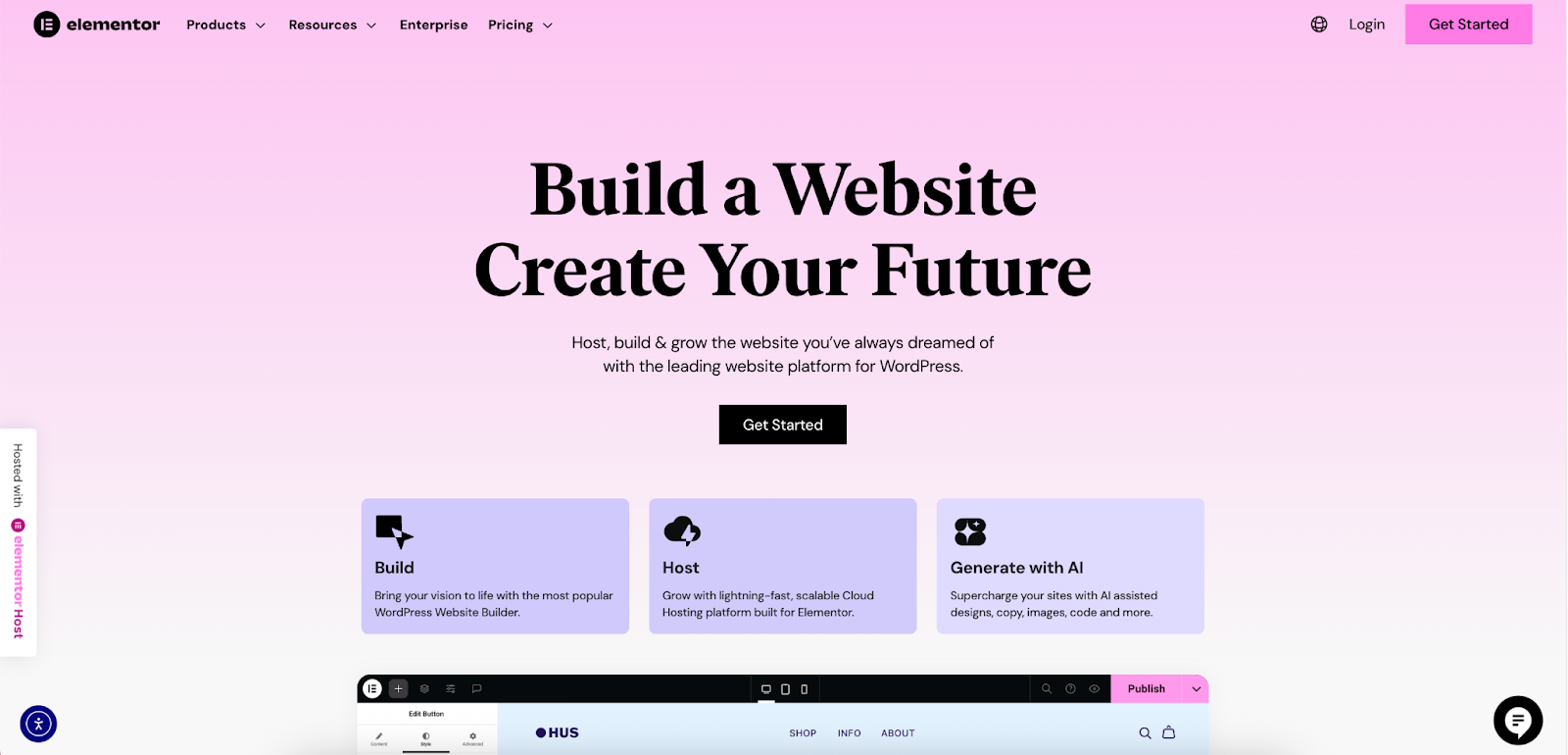
Online Marketplaces
Online marketplaces are large, established platforms that attract millions of shoppers. They function like massive digital shopping malls where numerous third-party sellers can list their products.
These platforms provide immense visibility and a built-in customer base, making them an excellent channel for product discovery and customer acquisition. However, they often come with significant competition, transaction fees, and less control over branding and customer interaction.
Social Commerce Platforms
Social commerce integrates the shopping experience directly into social media platforms. With billions of active users, platforms like Facebook, Instagram, and TikTok have become powerful channels for brands to connect with customers and drive sales.
Social commerce allows for a more interactive and serendipitous shopping experience, where users can discover and purchase products without leaving their favorite apps. This is particularly effective for visually appealing products and for brands targeting younger demographics.
Niche and Specialty Marketplaces
Niche marketplaces cater to specific product categories or communities. Whether it’s handmade goods, vintage fashion, or unique art, these platforms attract a dedicated audience with a strong interest in a particular type of product. Selling on a niche marketplace allows you to connect with a highly targeted and motivated group of buyers, often resulting in higher conversion rates and a more loyal customer base.
The 26 Best Platforms for Selling Online
Here is a curated list of 26 of the most effective websites and marketplaces for selling your products online in 2025 .
Building Your Own Store
1. WordPress with Elementor + WooCommerce

For ultimate control and scalability, nothing beats building your own eCommerce website. Combining the power of WordPress, the flexibility of the Elementor website builder, and the robust functionality of WooCommerce creates a professional eCommerce solution that you own completely.
Elementor empowers web creators to build any type of website visually using an intuitive drag-and-drop builder, eliminating the need for complex coding. This is ideal for business owners who want a professional site without a steep learning curve. You can design every aspect of your store, from product pages and listings to the checkout process, ensuring a unique and branded customer experience. With features like the
Theme Builder, Popup Builder, and a vast library of widgets, you have all the tools needed to create a high-converting online store that stands out from the generic templates of marketplaces.
General Marketplaces
2. Amazon
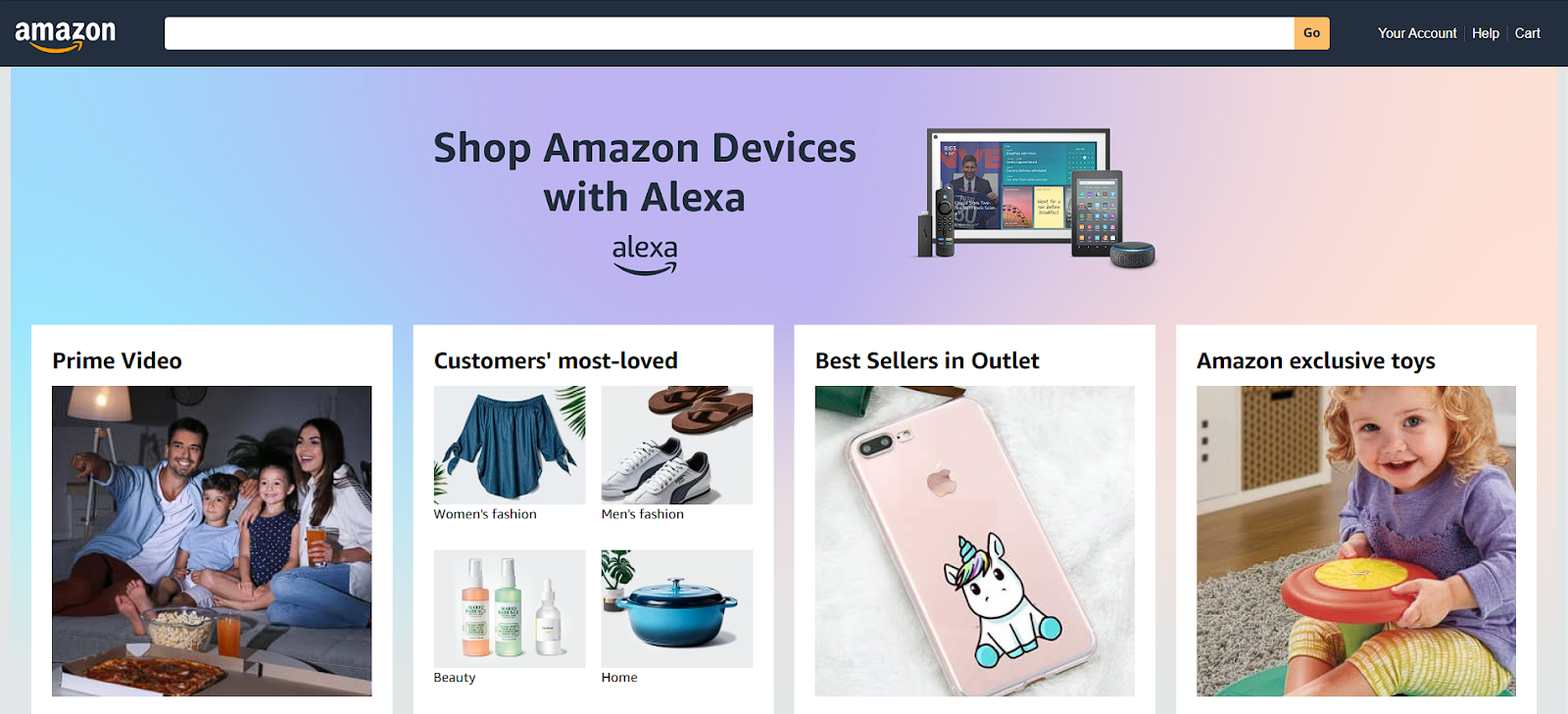
As the largest eCommerce player in the United States, Amazon offers unparalleled reach to a massive audience of shoppers ready to buy. It’s an essential platform for brands looking to maximize visibility and sales volume.
- Best for: High-volume sales of a wide variety of new products.
- Pros: Huge customer base, trusted platform, robust fulfillment services (Fulfillment by Amazon – FBA).
- Cons: High competition, significant fees, strict seller rules, limited brand control.
3. eBay
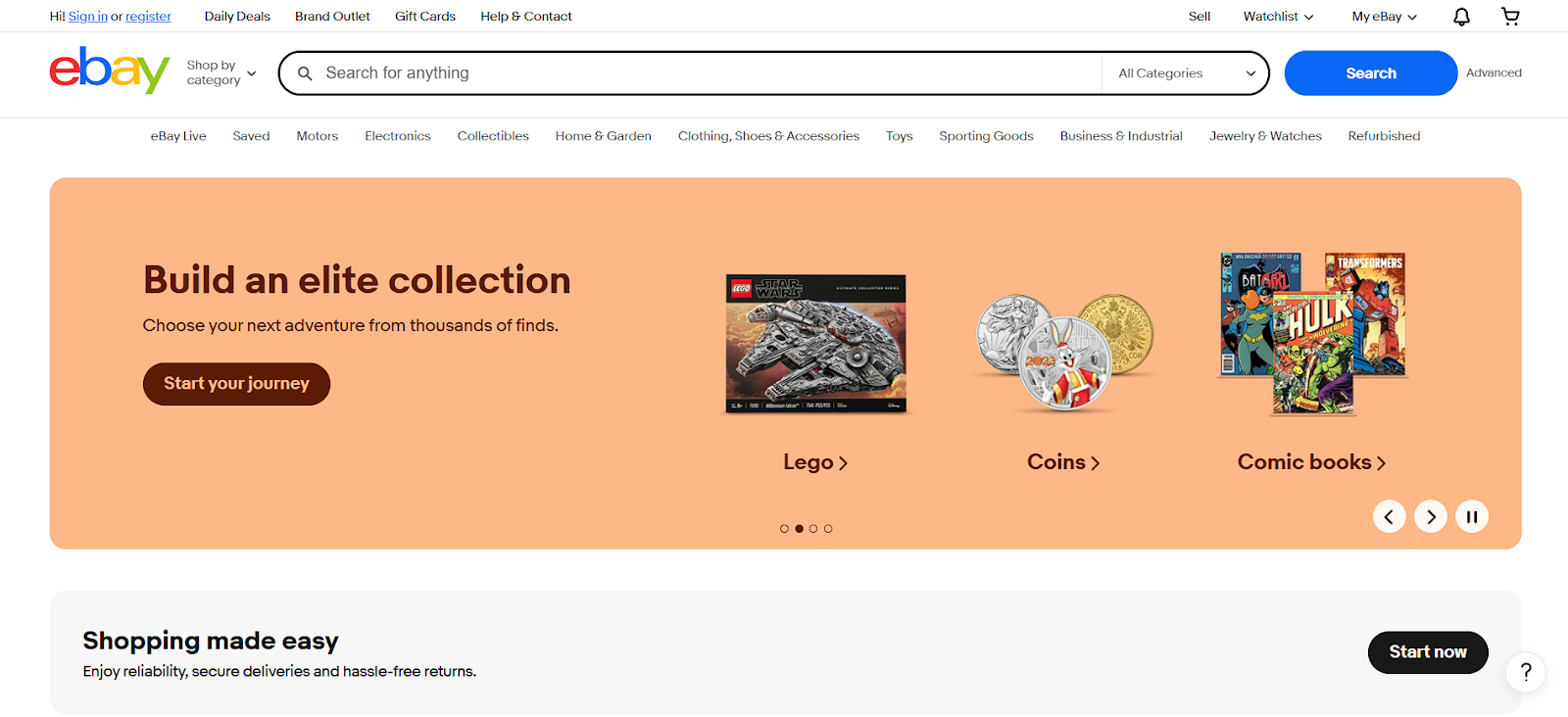
One of the original online marketplaces, eBay is a versatile platform for selling new and used items. Its auction-style and fixed-price listing formats make it suitable for a wide range of products, from common goods to rare collectibles.
- Best for: Used items, vintage goods, collectibles, and auction-style sales.
- Pros: Global audience, flexible selling formats, established reputation.
- Cons: Seller fees can be complex, competition on popular items, buyer-favored dispute resolution.
4. Walmart Marketplace
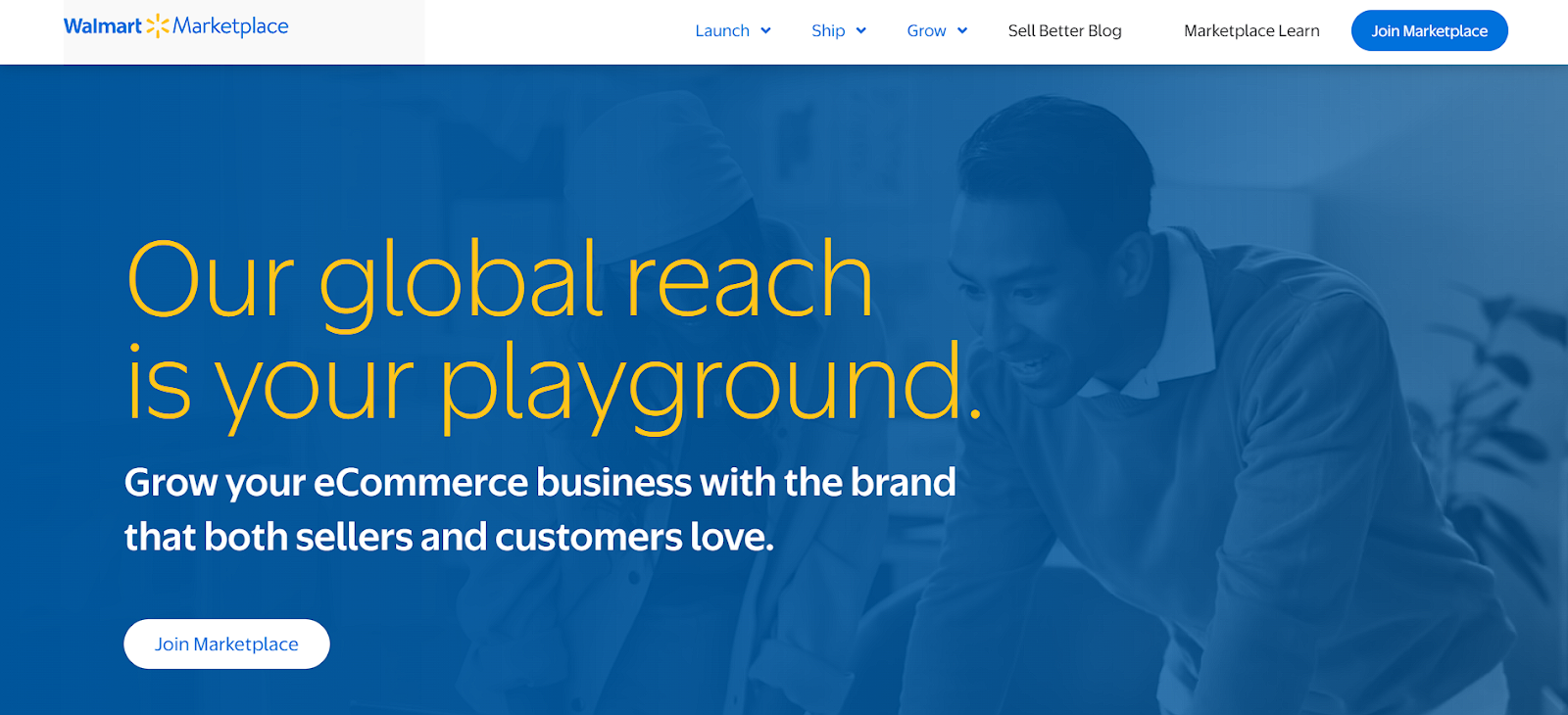
Walmart Marketplace is a curated community of professional sellers, offering access to over 120 million monthly shoppers. Its stricter seller requirements result in less competition compared to Amazon, providing more brand authority.
- Best for: Established brands and professional sellers with a proven track record.
- Pros: Large customer base, less competition than Amazon, trusted brand name.
- Cons: Strict application process, less brand control than your own site.
5. Google Shopping

Google Shopping is a retail search engine that displays products from various retailers directly in Google search results. With both free organic listings and paid shopping ads, it’s a powerful channel for product discovery.
- Best for: Driving traffic to your own website and increasing product visibility in search.
- Pros: Free organic listings, direct access to users with high purchase intent, integration with Google Ads.
- Cons: Highly competitive for popular search terms, requires a well-optimized product feed.
6. Etsy
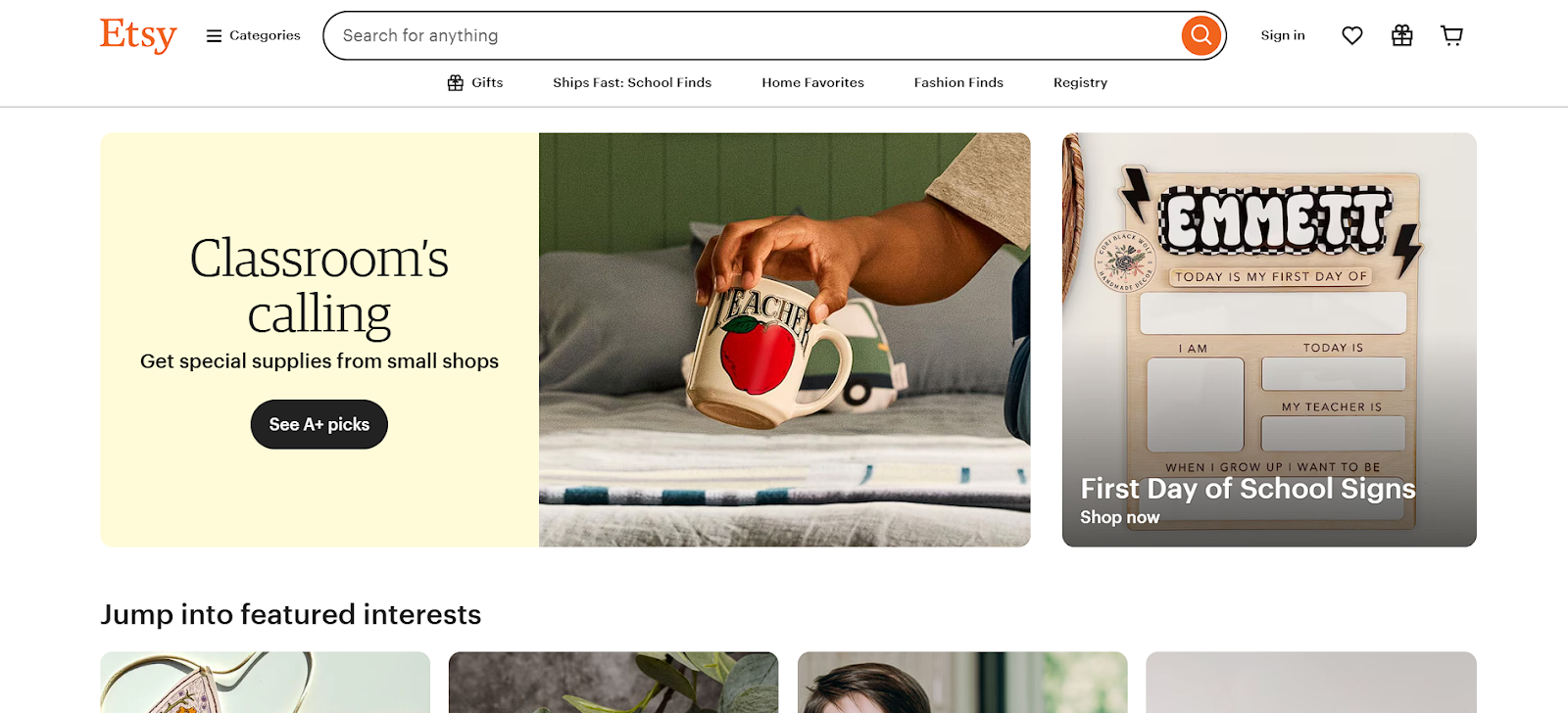
Etsy is the go-to marketplace for handmade goods, vintage items, and craft supplies. It has a dedicated community of buyers actively seeking unique and creative products.
- Best for: Artisans, crafters, and sellers of unique handmade or vintage items.
- Pros: Targeted audience, strong community feel, straightforward setup.
- Cons: Niche focus may not suit all products, transaction and listing fees, high competition within categories.
7. Bonanza
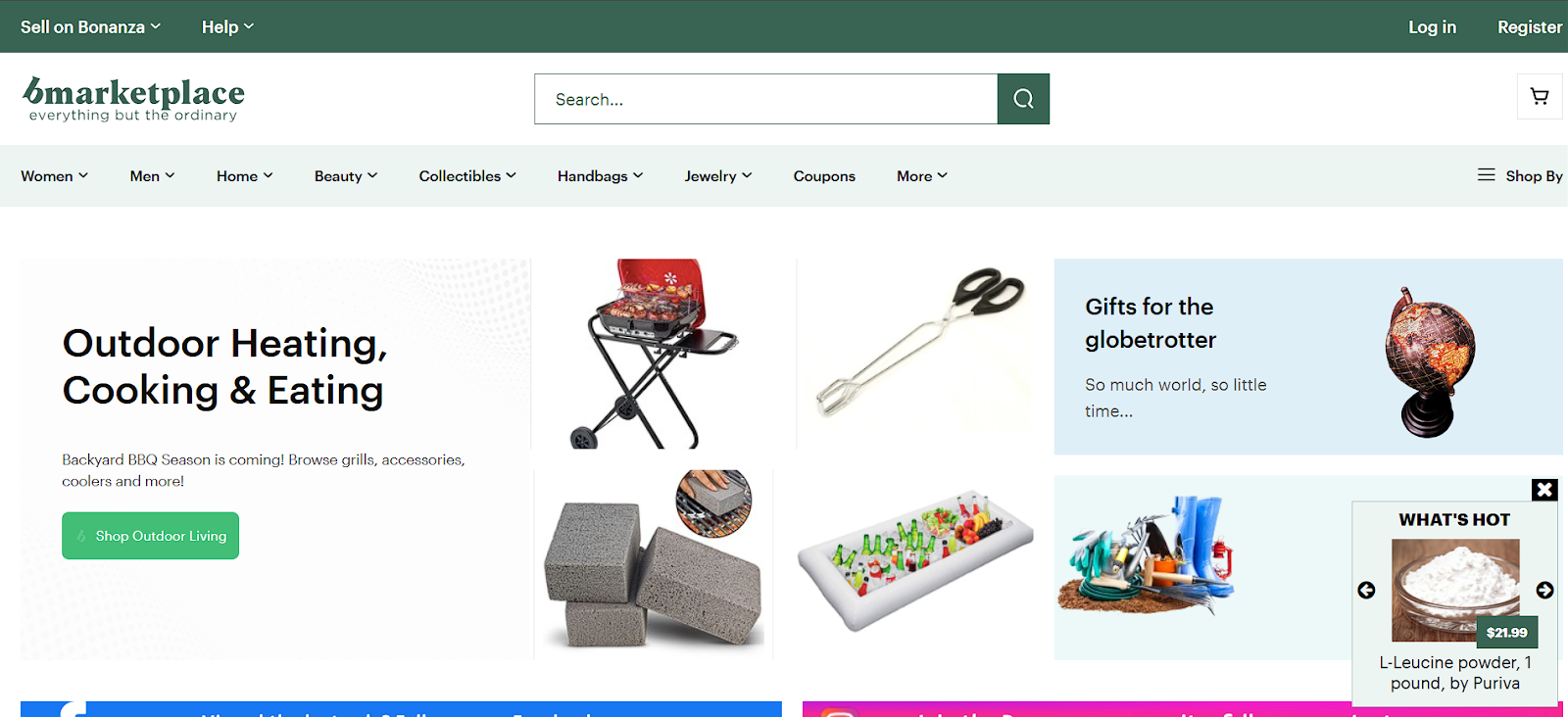
Bonanza is a seller-centric marketplace that focuses on unique items. It positions itself as an alternative to larger marketplaces, with lower fees and tools to import listings from other platforms like eBay and Amazon.
- Best for: Sellers of unique fashion, home goods, and collectibles.
- Pros: Lower fees than many competitors, easy listing importation, seller-friendly policies.
- Cons: Smaller customer base than major marketplaces.
8. Craigslist
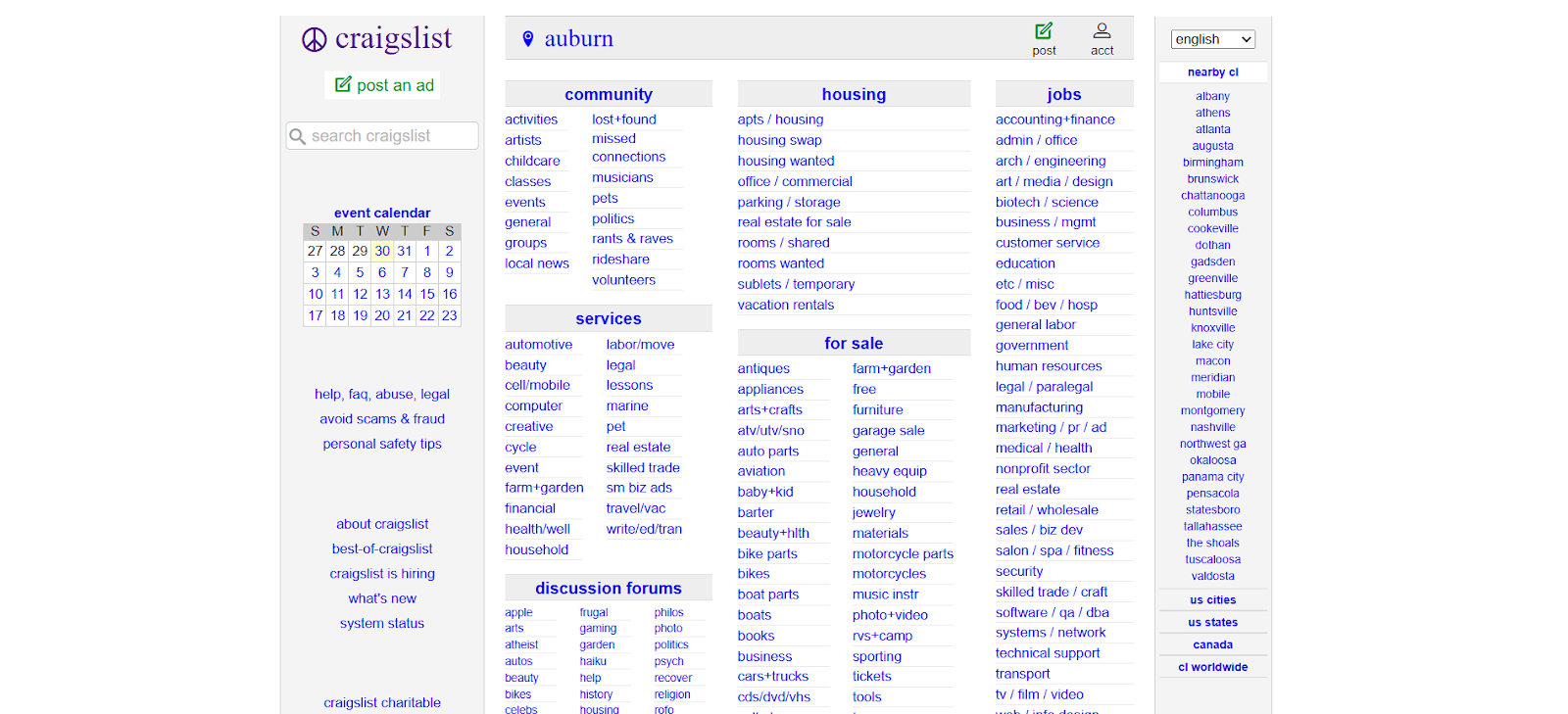
Craigslist is a localized online classifieds platform that is best suited for selling large, bulky items locally to avoid shipping costs. It is a no-frills platform with a focus on local transactions.
- Best for: Used furniture, vehicles, and other large items for local pickup.
- Pros: Free to list most items, local focus eliminates shipping.
- Cons: High risk of scams, no payment processing or seller protection, basic interface.
Social Commerce Platforms
9. Facebook Marketplace & Shops
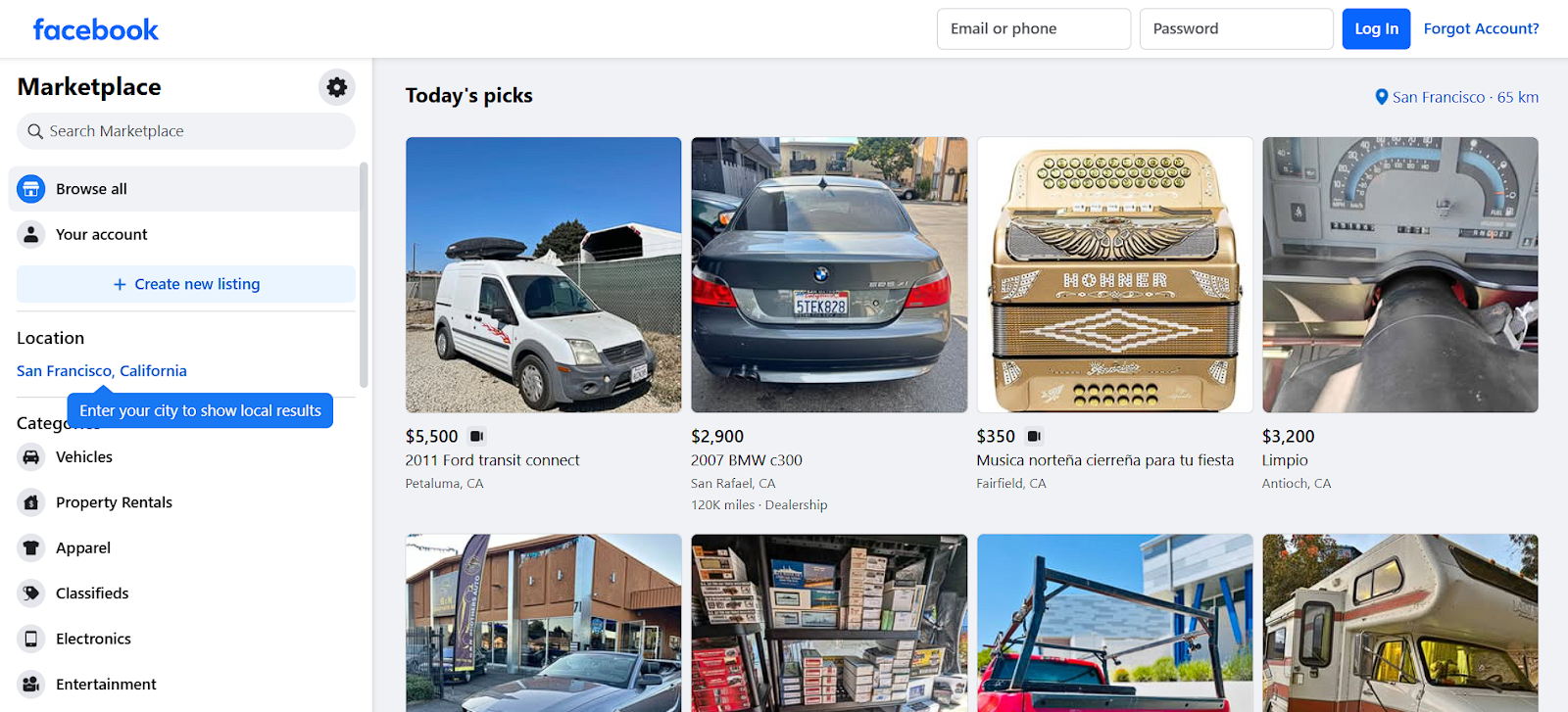
With billions of users, Facebook provides a massive built-in audience. Facebook Marketplace is ideal for local sales of used goods, while Facebook Shops allows businesses to create a full storefront on their Facebook Page and Instagram profile.
- Best for: Local sales of used items (Marketplace) and brands wanting an integrated social store (Shops).
- Pros: Huge user base, no listing fees for Marketplace, seamless integration with social media marketing.
- Cons: High competition, risk of scams on Marketplace, requires an active social media presence.
10. Instagram Shopping
Instagram is a highly visual platform, making it perfect for selling products like fashion, beauty, and home decor. Instagram Shopping allows businesses to tag products in posts and stories, creating a seamless path to purchase.
- Best for: Visually driven brands targeting younger demographics.
- Pros: High engagement rates, direct link between content and commerce, strong influencer marketing ecosystem.
- Cons: Requires a strong visual content strategy, only available to business accounts.
11. Pinterest

Pinterest is a visual discovery engine where users look for inspiration and ideas. With shoppable Pins, brands can turn that inspiration into sales. It’s particularly effective for products in categories like home decor, fashion, and DIY.
- Best for: Brands with high-quality visual content in lifestyle niches.
- Pros: Users are in a “shopping” mindset, long lifespan of pins, drives traffic to your website.
- Cons: Requires consistent creation of high-quality visual content.
12. TikTok Shop
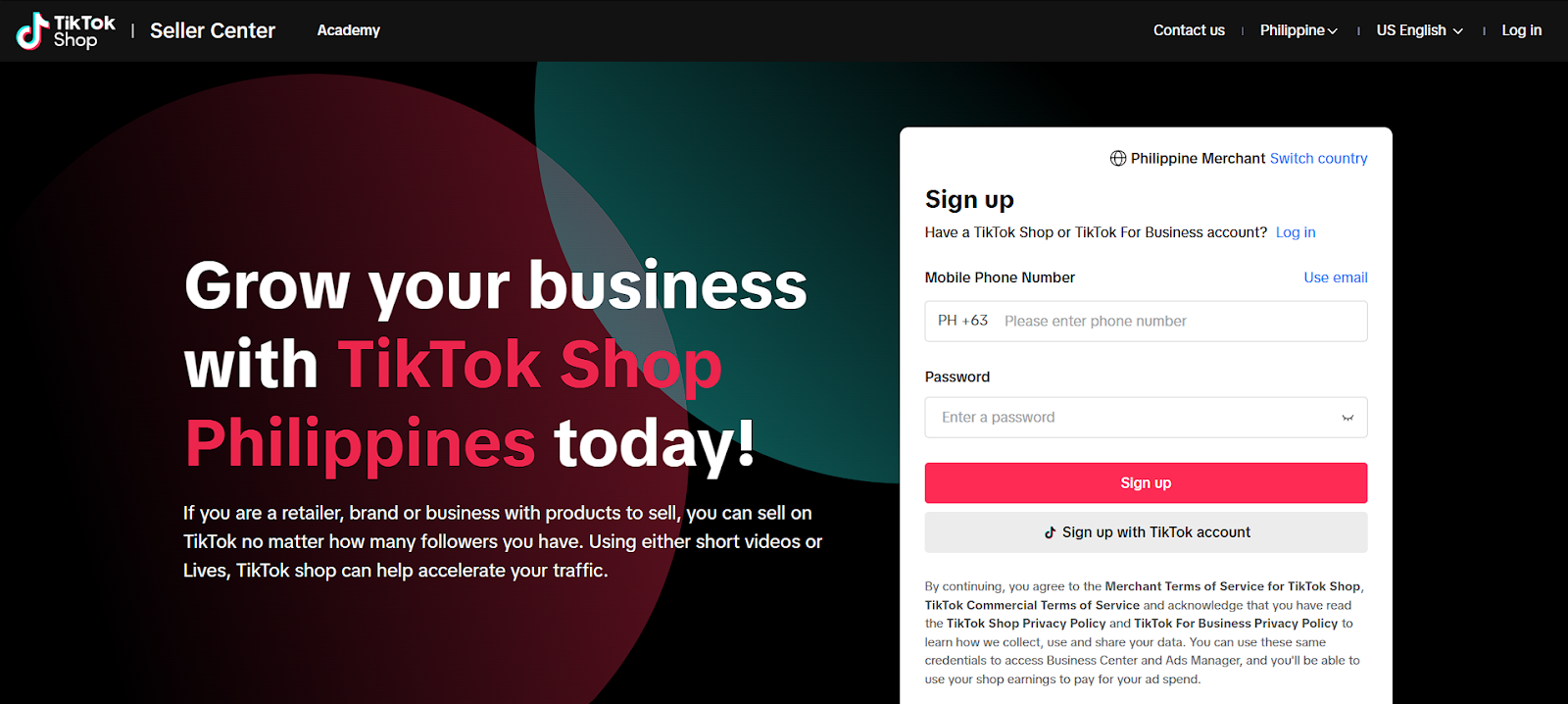
TikTok has emerged as a major force in social commerce, especially among Gen Z. Its algorithm can make products go viral overnight. The #TikTokMadeMeBuyIt trend showcases its powerful influence on purchasing decisions.
- Best for: Brands with products that can be demonstrated in short, engaging videos.
- Pros: Potential for viral reach, highly engaged user base, integrated shopping experience.
- Cons: Trends move very quickly, requires creative video content.
Niche & Specialty Marketplaces
13. Ruby Lane
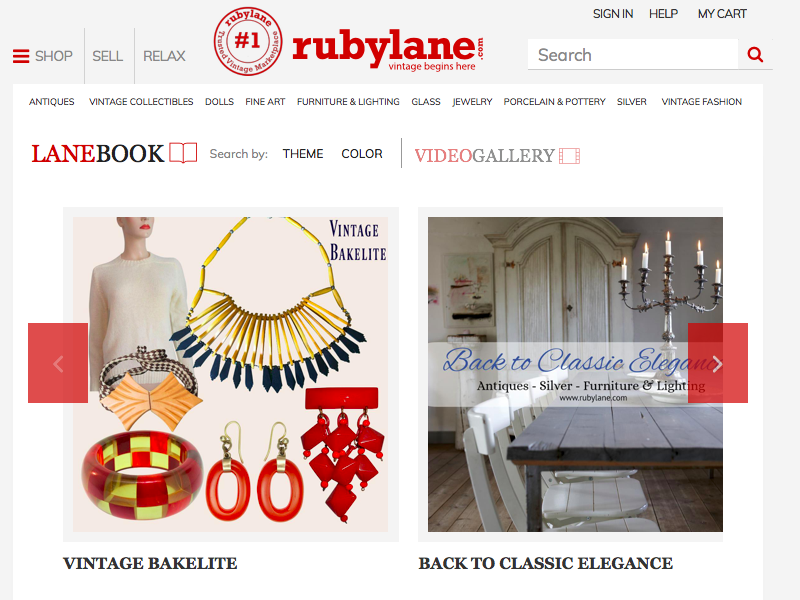
Ruby Lane is a curated marketplace for high-quality antiques, vintage collectibles, art, and jewelry. It caters to a discerning audience of collectors and enthusiasts.
- Best for: Sellers of high-end antiques and vintage items.
- Pros: Highly targeted audience, reputation for quality, fixed-price format.
- Cons: Monthly maintenance fees, requires high-quality items.
14. ArtFire
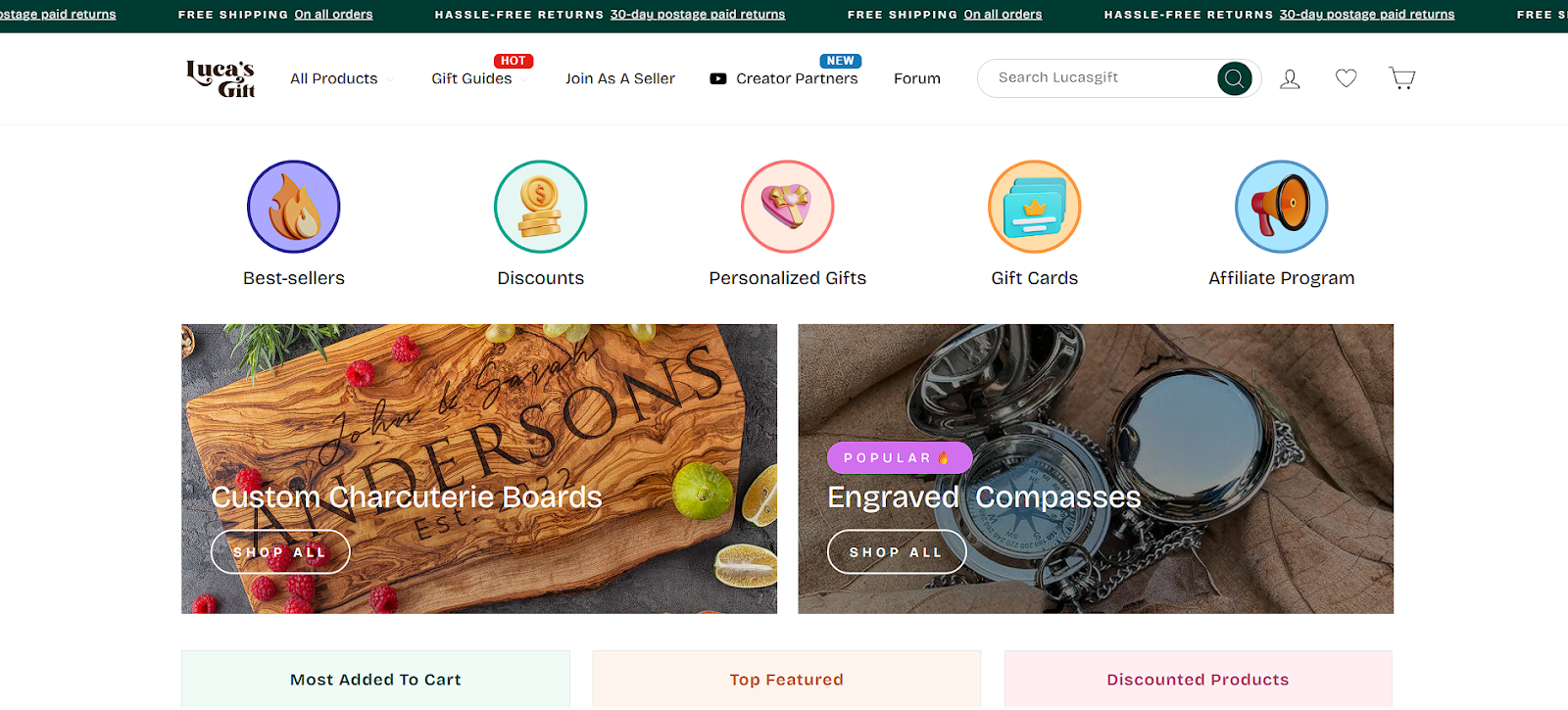
ArtFire is a marketplace for handmade goods, vintage items, and craft supplies, similar to Etsy. It offers different seller plans and customizable storefronts.
- Best for: Artisans and crafters looking for an alternative to Etsy.
- Pros: Seller-focused community, customizable shop options.
- Cons: Smaller audience than Etsy.
15. Poshmark
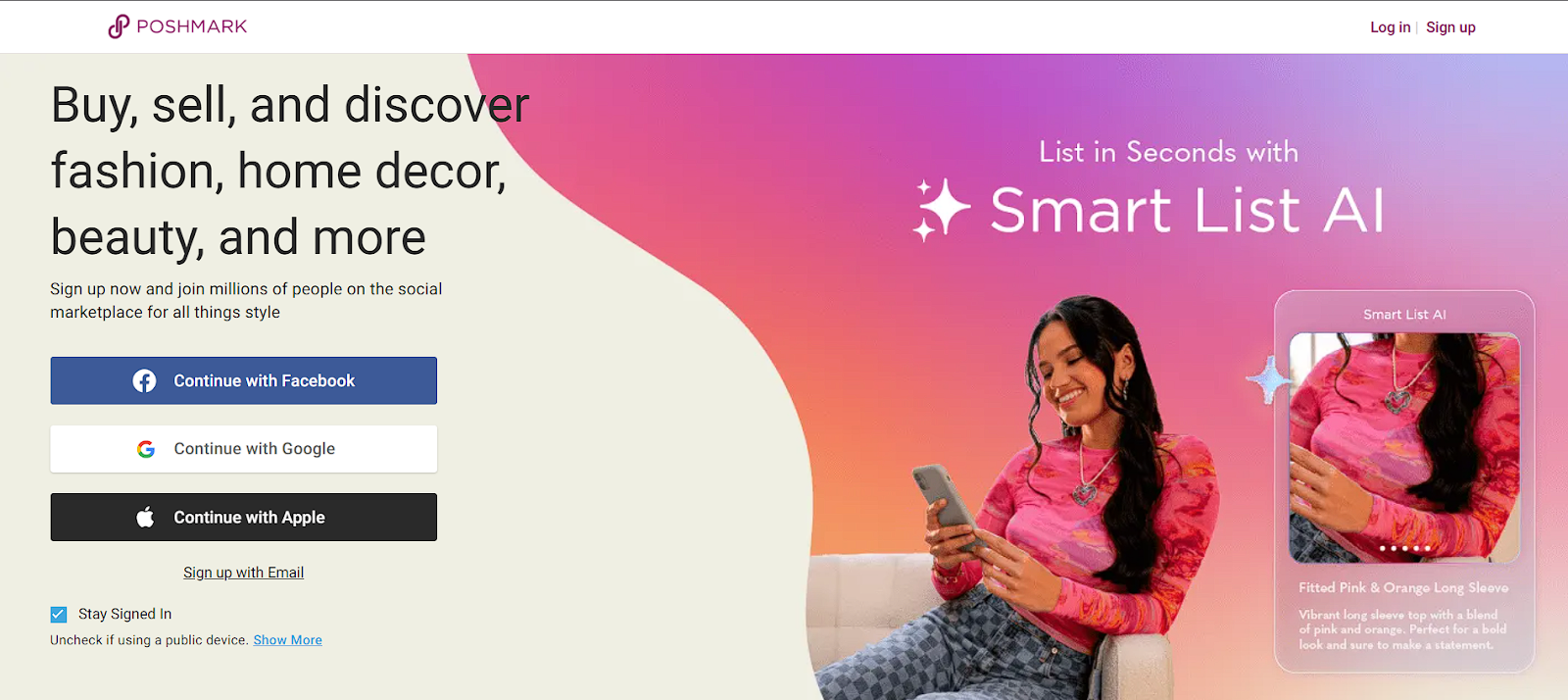
Poshmark is a social commerce marketplace focused on new and used clothing, shoes, and accessories. It has a strong community aspect, with users sharing and discovering items through virtual “Posh Parties.”
- Best for: Reselling brand-name fashion and accessories.
- Pros: Simple listing process, strong social community, pre-paid shipping labels.
- Cons: High commission fees (20% for sales over $15).
16. Depop
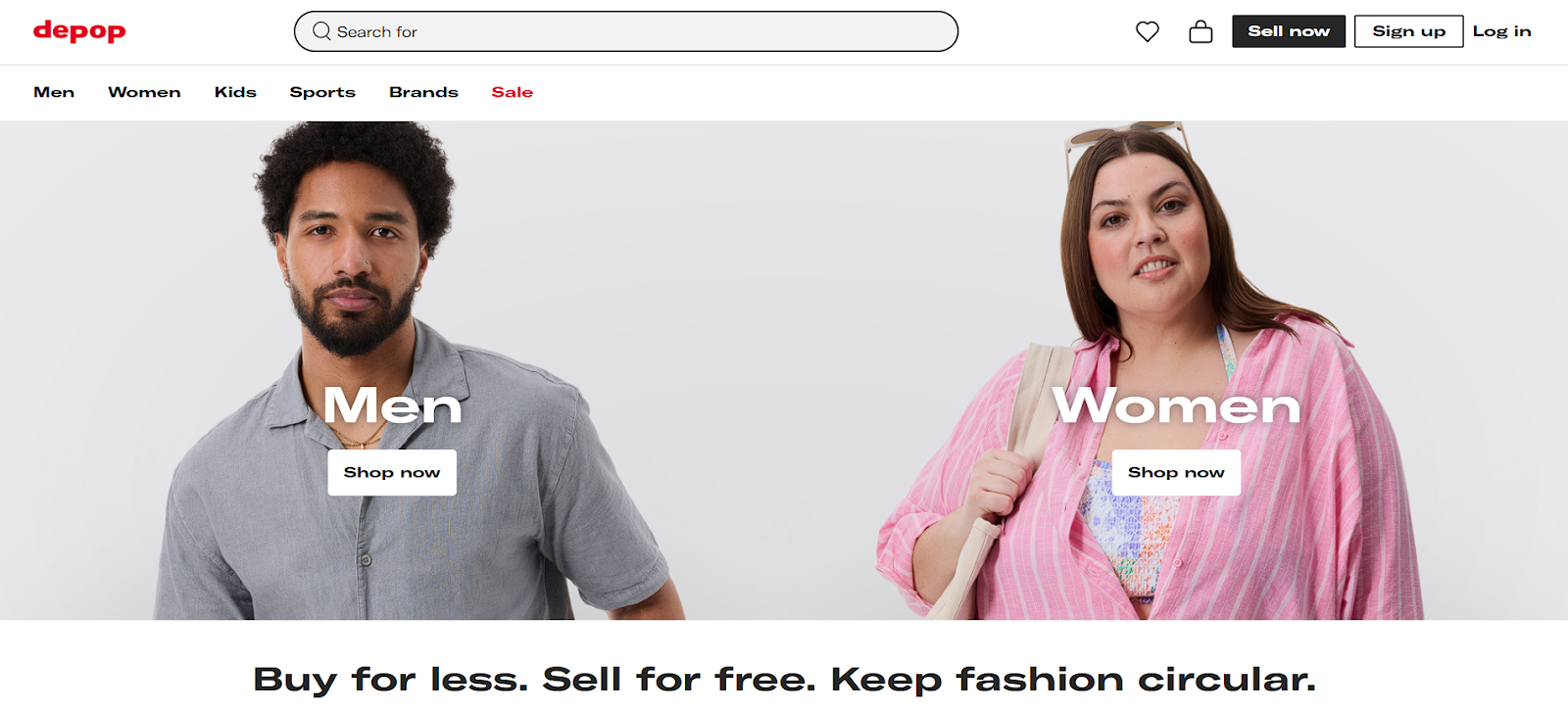
Depop is a fashion marketplace popular with a younger, trend-focused audience. It has a visual interface similar to Instagram and is a hub for unique, vintage, and streetwear styles.
- Best for: Sellers of vintage, streetwear, and unique fashion items targeting Gen Z.
- Pros: Highly engaged young audience, visual and mobile-first platform.
- Cons: 10% commission fee, requires a strong brand aesthetic.
17. ThredUP
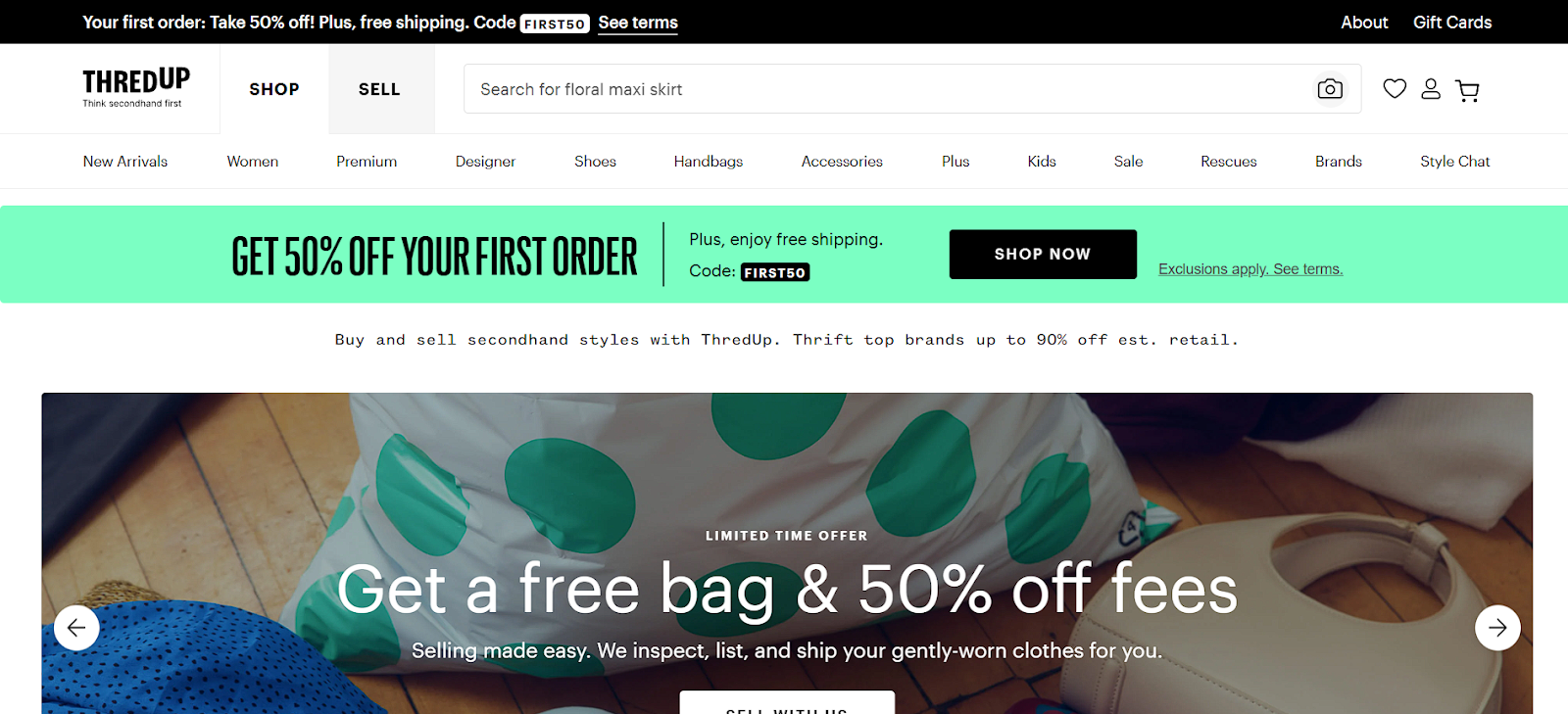
ThredUP is one of the largest online consignment and thrift stores. Unlike other platforms, sellers send their items to ThredUP, which then photographs, lists, and ships the products for them.
- Best for: People who want to sell used clothing with minimal effort.
- Pros: Very low effort for sellers, handles all logistics.
- Cons: Low payout percentages, sellers have no control over pricing.
18. Mercari
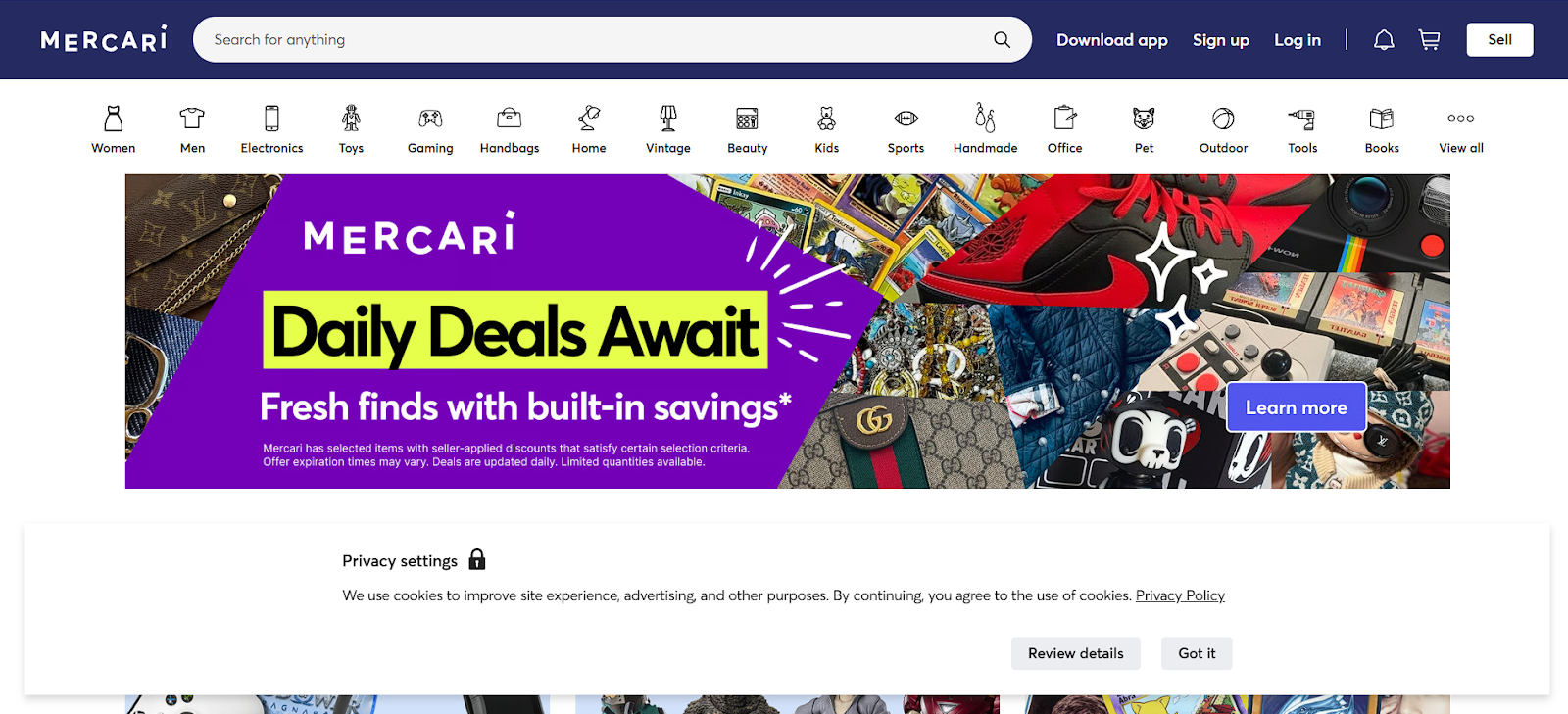
Mercari is a Japanese marketplace that has gained popularity in the U.S. for its simplicity. It’s known as “The Selling App” and makes it incredibly easy to list almost anything from your phone.
- Best for: Casual sellers looking to quickly declutter and sell a wide variety of items.
- Pros: Very easy to list items, flat 10% selling fee, seller protection.
- Cons: High competition, less specialized than other platforms.
19. Swappa
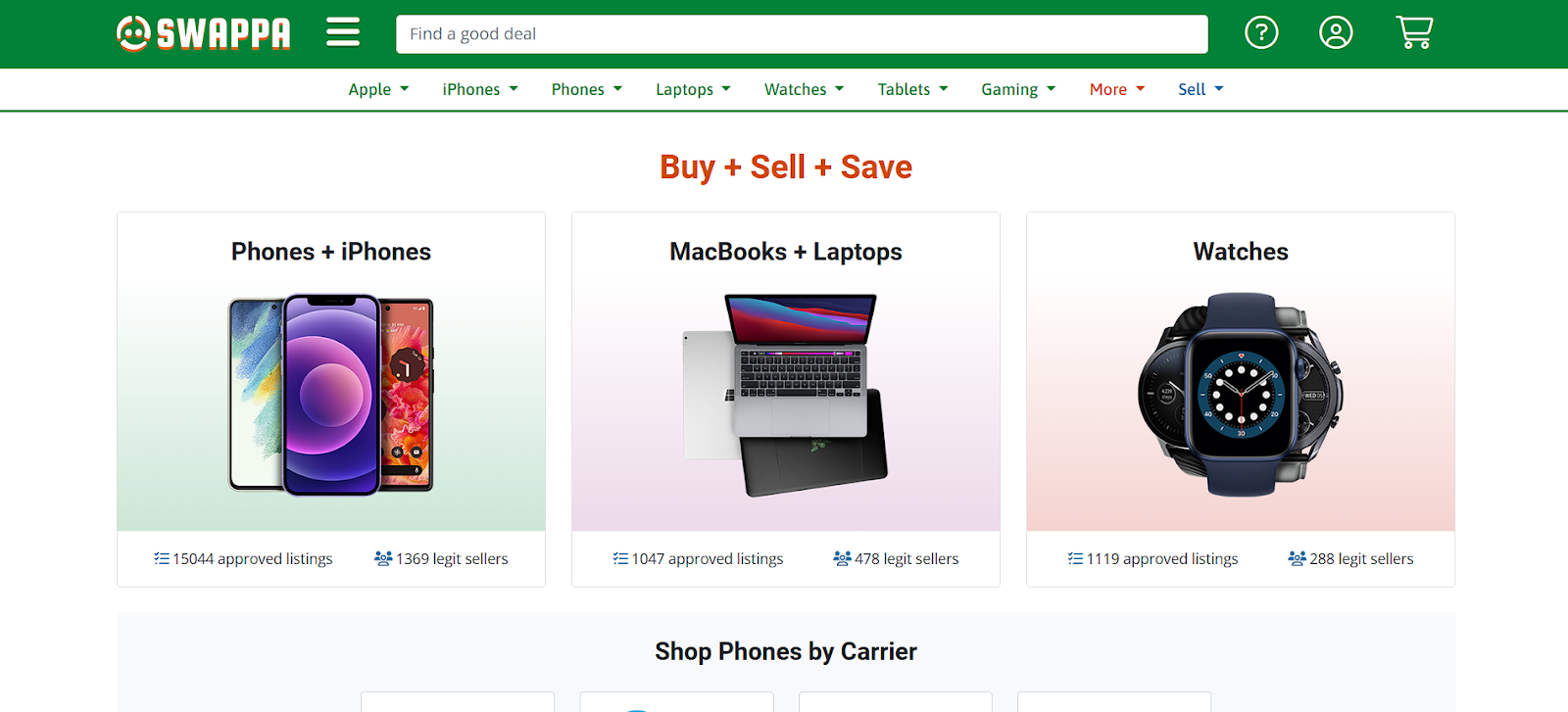
Swappa is a marketplace dedicated to used electronics, such as phones, laptops, and cameras. It has a strict “no junk” policy, ensuring all devices listed are fully functional.
- Best for: Selling used electronics in good condition.
- Pros: Strong focus on quality and safety, no seller fees (fees are paid by the buyer).
- Cons: Strict listing requirements, limited to electronics.
20. Gazelle
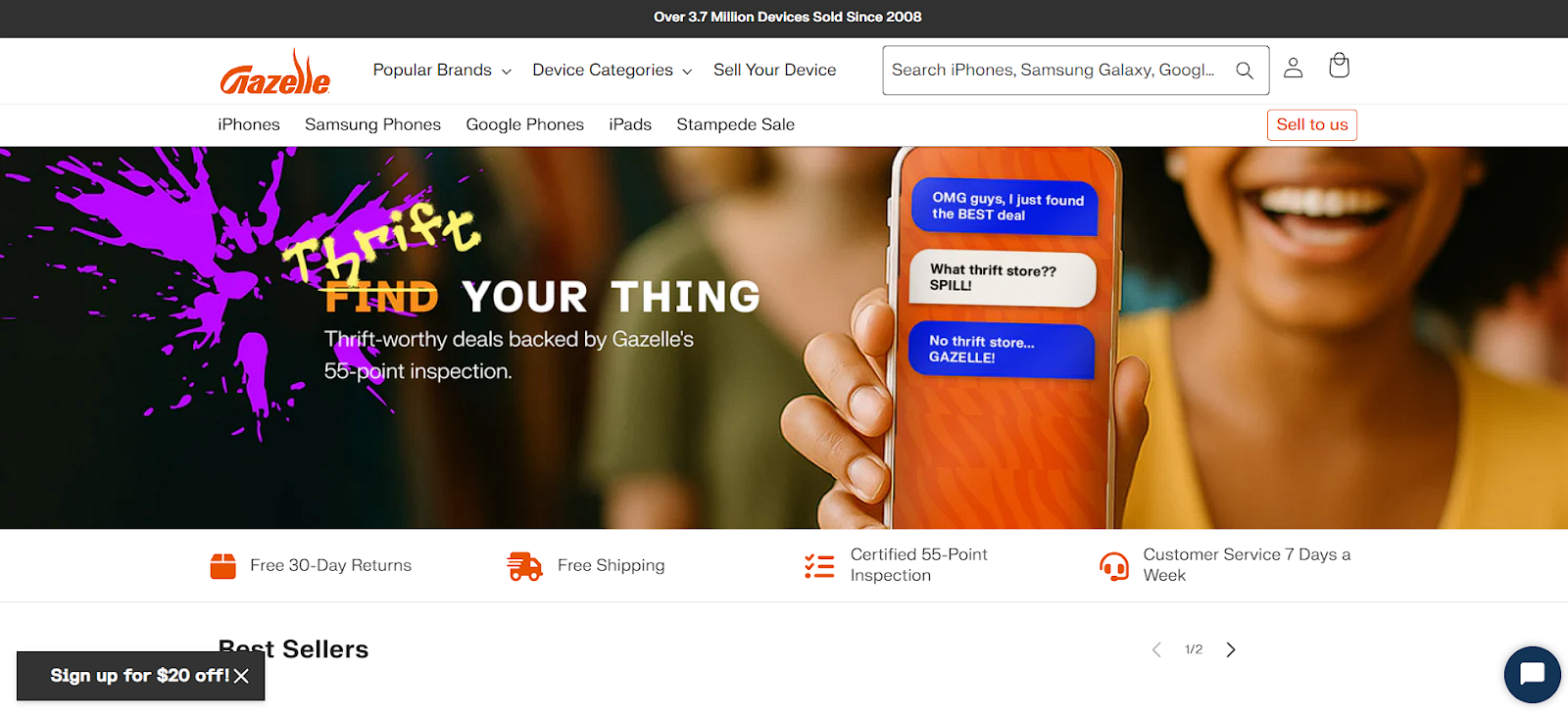
Gazelle is a service that buys used electronics directly from consumers. It offers a simple way to get cash for old devices without the hassle of creating listings or dealing with buyers.
- Best for: Quickly selling popular electronics like iPhones and MacBooks.
- Pros: Extremely simple process, instant offer, free shipping.
- Cons: Payouts are generally lower than selling directly to another consumer.
21. Society6

Society6 is a print-on-demand marketplace for artists. Artists upload their designs, and Society6 handles the printing, shipping, and customer service for a wide range of products, from art prints to home decor.
- Best for: Artists and designers who want to sell their work on various products without managing inventory.
- Pros: No upfront costs, handles all production and shipping, wide product range.
- Cons: Artists receive only a small percentage of the retail price.
22. Redbubble
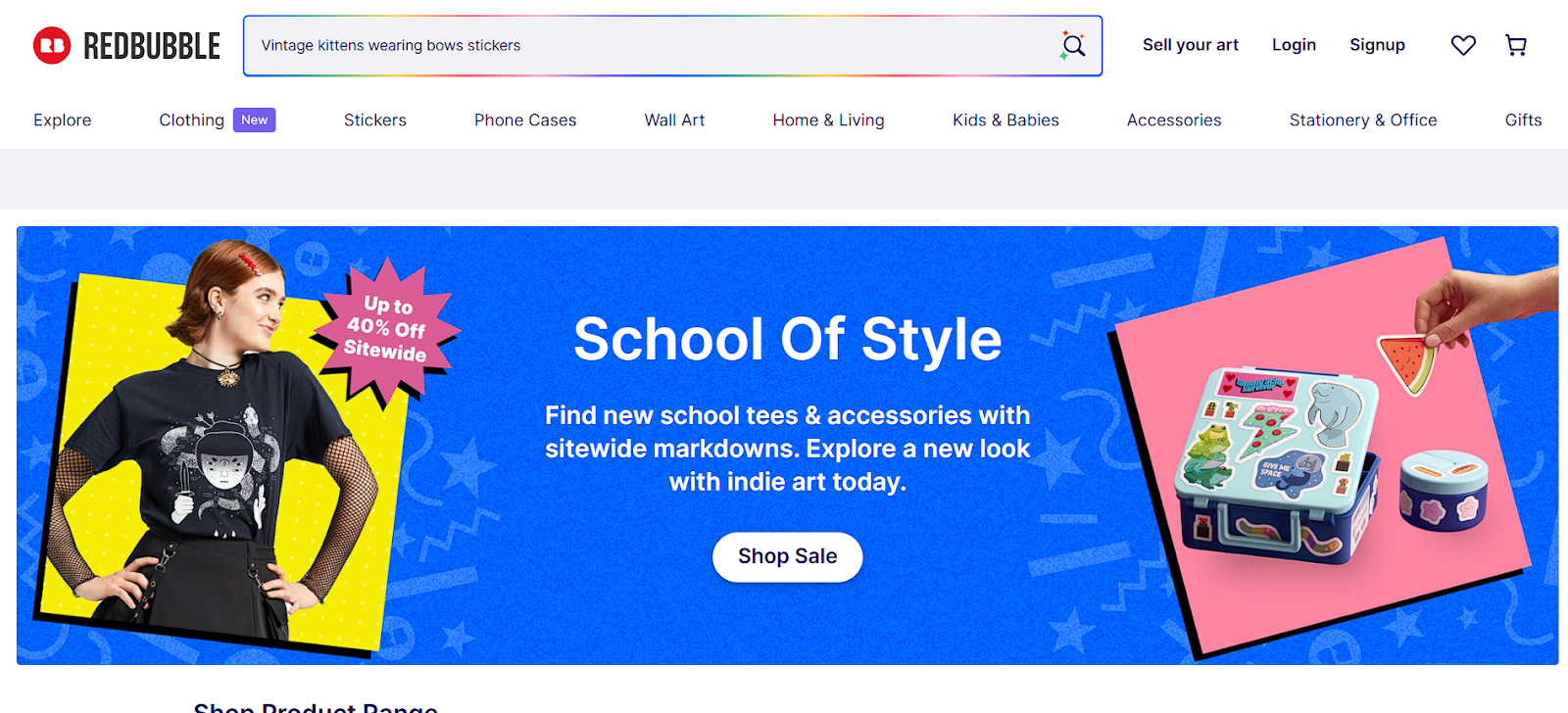
Similar to Society6, Redbubble is a print-on-demand marketplace where independent artists can sell their designs on products like t-shirts, stickers, and phone cases.
- Best for: Graphic designers and illustrators.
- Pros: Large global audience, artists set their own profit margins.
- Cons: High competition among artists.
23. AbeBooks
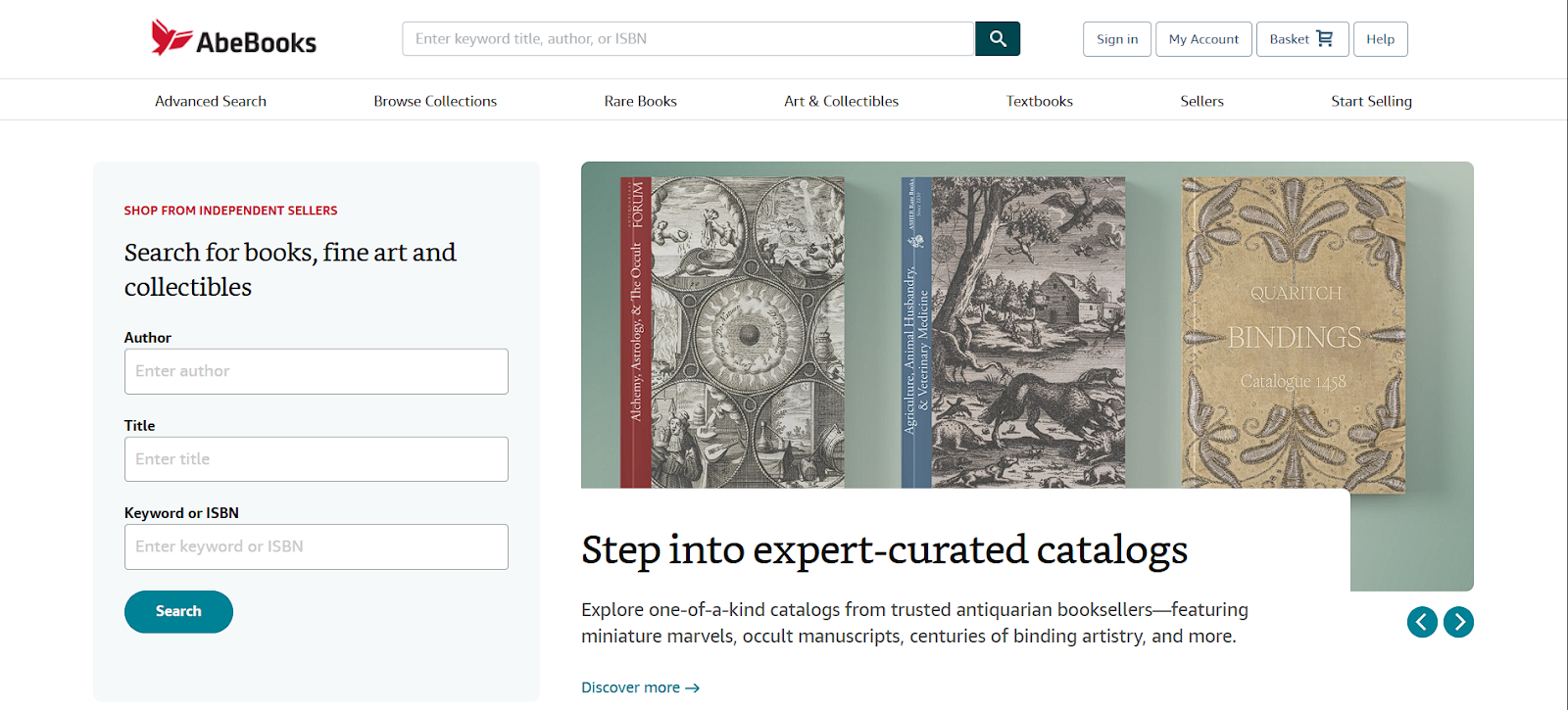
AbeBooks is an online marketplace for books, fine art, and collectibles. It is a go-to platform for millions of new, used, rare, and out-of-print books.
- Best for: Independent booksellers and collectors.
- Pros: Huge inventory and customer base for books, caters to a niche audience.
- Cons: Monthly subscription fees for sellers, commission fees.
24. Chairish
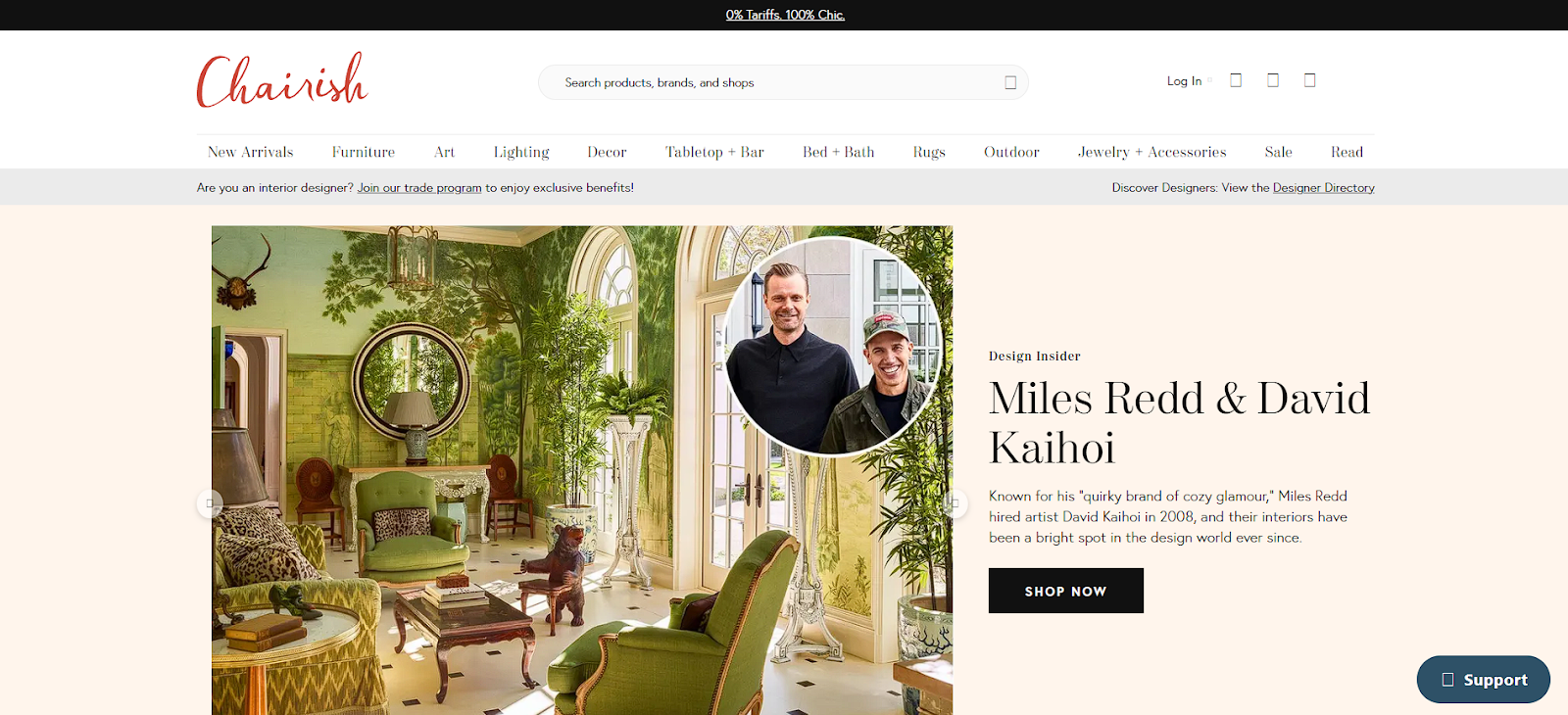
Chairish is a curated online marketplace for high-end vintage furniture, art, and home decor. Sellers submit their items for approval by Chairish curators, ensuring a high-quality selection.
- Best for: Sellers of chic and unique vintage home furnishings.
- Pros: Access to a high-end market, curated inventory attracts serious buyers.
- Cons: High commission rates, selective curation process.
25. Wayfair
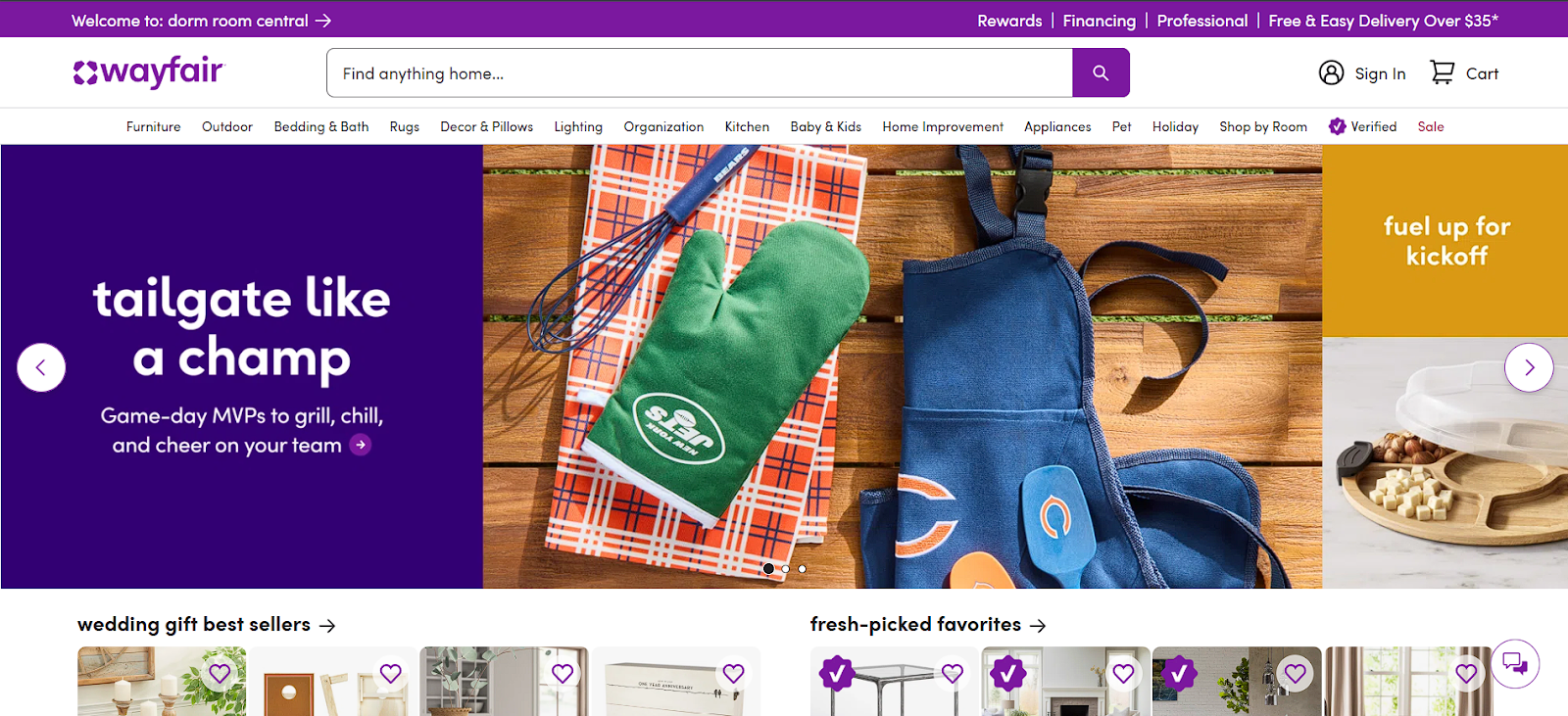
Wayfair is a massive online retailer of furniture and home goods. It works with thousands of suppliers to offer a vast selection of products. Selling on Wayfair gives brands access to a huge customer base actively shopping for home items.
- Best for: Furniture and home decor brands that can handle large order volumes.
- Pros: Enormous customer base, strong brand recognition in the home goods space.
- Cons: Operates on a wholesale model, not a direct marketplace for small sellers.
26. Rakuten
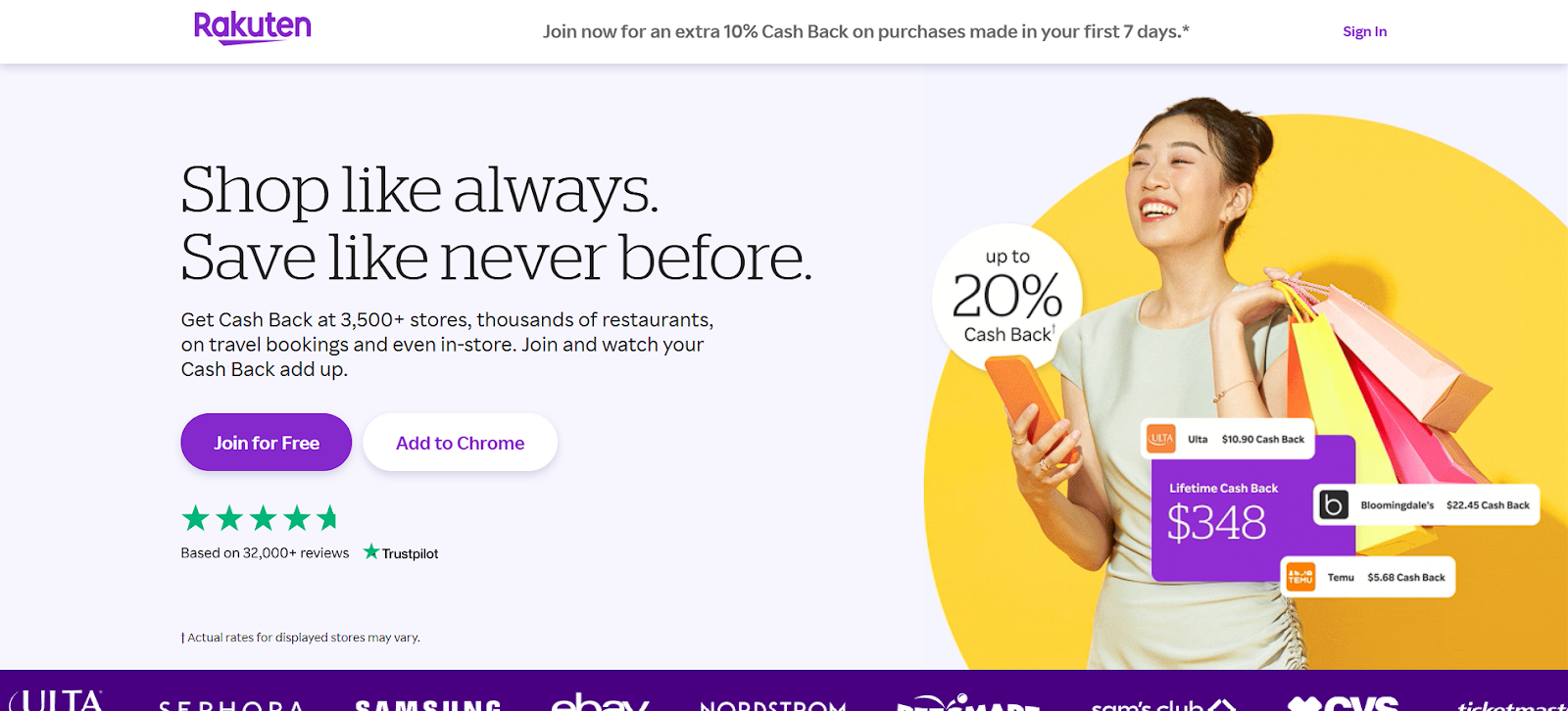
Rakuten is a major Japanese eCommerce company that operates a global marketplace. It offers a “super points” loyalty program that incentivizes repeat purchases, making it a powerful platform in the Asian market and beyond.
- Best for: Brands looking to expand their reach internationally, particularly in Asia.
- Pros: Strong loyalty program, global reach, customizable storefronts.
- Cons: Seller fees and a monthly subscription are required.
How to Choose the Right Selling Platform for You
With so many options, selecting the right platform depends on your specific situation. Consider the following factors to make an informed decision:
- Your Products: Are they handmade, used, new, or digital? The nature of your product will immediately narrow down your choices. Niche marketplaces are great for specialized items, while general marketplaces work well for common goods.
- Your Target Audience: Where do your ideal customers spend their time online? If you’re targeting Gen Z, platforms like Depop and TikTok are essential. If you’re selling high-end antiques, Ruby Lane is a better fit.
- Fees and Pricing: Carefully review the fee structure of each platform. This can include listing fees, transaction fees, payment processing fees, and monthly subscriptions. These costs will directly impact your profit margins.
- Brand Control: How important is it for you to have a branded experience? Marketplaces offer limited customization, while building your own site with a tool like Elementor gives you complete control over the look and feel of your store.
- Your Level of Involvement: How much time and effort can you dedicate to selling? Platforms like ThredUP require minimal effort, while managing your own website is a more involved but ultimately more rewarding endeavor.
Building Your Own High-Converting Store with Elementor
While marketplaces are excellent for customer acquisition, the most sustainable long-term strategy is to build your own eCommerce website. It serves as your brand’s central hub, giving you full control and a direct line to your customers. Elementor, combined with WordPress and WooCommerce, provides an unparalleled solution for creating a professional and effective online store.
Complete Creative Control and Branding
Unlike the rigid templates of marketplaces, Elementor allows you to build a website that is a true reflection of your brand. With its visual drag-and-drop editor, you can design every detail of your store, from the homepage to product pages and the checkout flow. This ensures a unique and memorable brand experience that helps you stand out from the competition.
A Robust eCommerce Ecosystem
Elementor integrates with WooCommerce, the leading eCommerce plugin for WordPress. This combination gives you access to a massive ecosystem of extensions and plugins to add any functionality you can imagine, from advanced shipping options to subscription services. Elementor’s dedicated WooCommerce widgets allow you to customize your product archives, single product pages, and transactional pages like the cart and checkout.
Built-in Marketing Tools to Drive Sales
Driving traffic and converting visitors into customers is crucial for any online store. Elementor includes powerful marketing features to help you achieve this. The
Popup Builder can be used to capture leads with email sign-up forms, promote sales, and reduce cart abandonment. The
Form Builder allows you to create custom contact forms, surveys, and more, helping you gather customer feedback and build your email list.
No Marketplace Fees
One of the most significant advantages of having your own store is that you are not subject to the commission and transaction fees charged by marketplaces. While you will have costs associated with hosting and payment processing, you keep a much larger portion of your revenue. This financial independence allows you to reinvest more into your business, whether in product development, marketing, or customer service.
Wrapping Up
The online selling landscape in 2025 offers more opportunities than ever before. From large marketplaces and social commerce platforms to niche communities, there is a channel for every type of product and seller. A successful strategy often involves a multi-channel approach, leveraging the reach of marketplaces to drive discovery while funneling customers back to your own branded website.
Building your own store with a powerful tool like Elementor gives you the freedom, control, and flexibility to create a sustainable and scalable business. It allows you to build a strong brand, foster direct customer relationships, and maximize your profitability. By carefully selecting the right platforms for your products and making your own website the core of your strategy, you can position your business for long-term success in the dynamic world of eCommerce.
Looking for fresh content?
By entering your email, you agree to receive Elementor emails, including marketing emails,
and agree to our Terms & Conditions and Privacy Policy.







